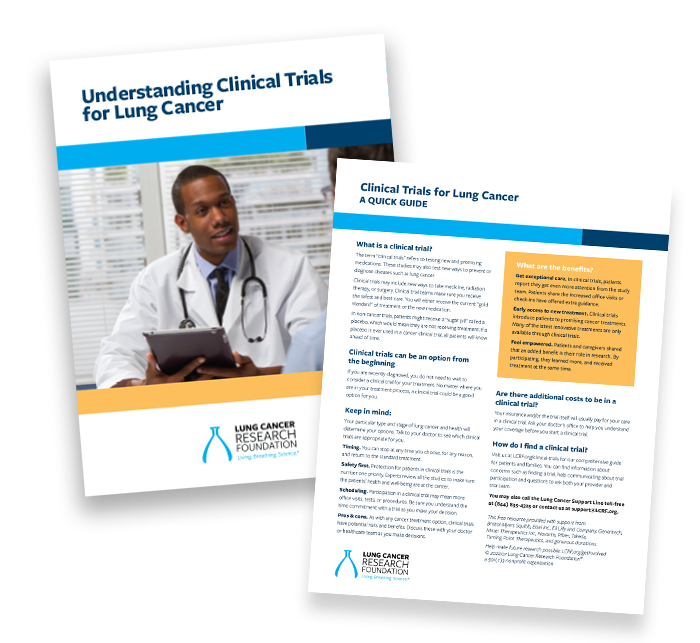What is a clinical trial?
The term “clinical trials” refers to testing new and promising medications. These studies may also test new ways to prevent or diagnose diseases such as lung cancer.
Clinical trials may include new ways to take medicine, radiation therapy, or surgery. Clinical trial teams make sure you receive the safest and best care. You will either receive the current “gold standard” of treatment or the new medication.
In non-cancer trials, patients might receive a “sugar pill” called a placebo, which would mean they are not receiving treatment. If a placebo is ever used in a cancer clinical trial, all patients will know ahead of time.

The information on this page is also available as a printed piece or instant download. Click here to have it shipped to you at no charge.
In addition, a complete guide to clinical trials is also available. The guide in web format can be found here.
Clinical trials can be an option from the beginning
If you are recently diagnosed, you do not need to wait to consider a clinical trial for your treatment. No matter where you are in your treatment process, a clinical trial could be a good option for you.
Keep in mind:
Your particular type and stage of lung cancer and health will determine your options. Talk to your doctor to see which clinical trials are appropriate for you.
Timing. You can stop at any time you choose, for any reason, and return to the standard treatment.
Safety first. Protection for patients in clinical trials is the number one priority. Experts review all the studies to make sure the patients’ health and well-being are at the center.
Scheduling. Participation in a clinical trial may mean more office visits, tests, or procedures. Be sure you understand the time commitment with a trial as you make your decision.
Pros & cons. As with any cancer treatment option, clinical trials have potential risks and benefits. Discuss these with your doctor or healthcare team as you make decisions.
What are the benefits?
Get exceptional care. In clinical trials, patients report they get even more attention from the study team. Patients share the increased office visits or check‑ins have offered extra guidance.
Early access to new treatment. Clinical trials introduce patients to promising cancer treatments. Many of the latest innovative treatments are only available through clinical trials.
Feel empowered. Patients and caregivers shared that an added benefit is their role in research. By participating, they learned more, and received treatment at the same time.
Are there additional costs to be in a clinical trial?
Your insurance and/or the trial itself will usually pay for your care in a clinical trial. Ask your doctor’s office to help you understand your coverage before you start a clinical trial.
How do I find a clinical trial?
Visit this link for our comprehensive guide for patients and families. You can find information about concerns such as finding a trial, help communicating about trial participation and questions to ask both your provider and trial team.
You may also call the Lung Cancer Support Line toll-free at (844) 835-4325 or contact us at support@LCRF.org.
These educational materials are provided at no cost to you, with support from Bristol-Myers Squibb, Eli Lilly and Company, The Janssen Pharmaceutical Companies Contributions Fund at the Johnson & Johnson Foundation (JJF), and other generous donations.